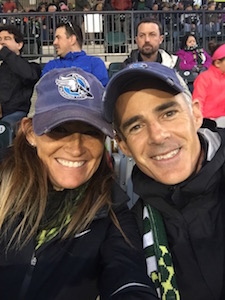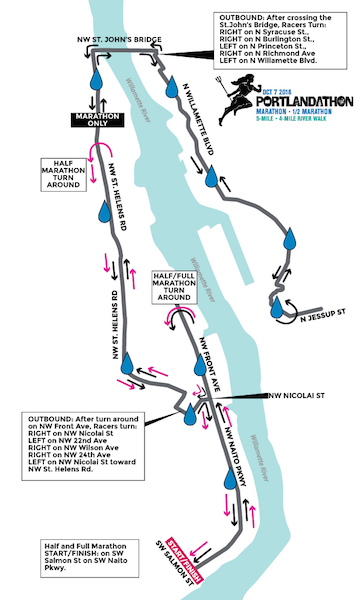New managers of struggling athletic events promise a turnaround.
After financial problems sunk Special Olympics Oregon and the Portland Marathon, both organizations are planning a comeback.
Special Olympics Oregon shelved its 2018 games after announcing in late June that the organization lost $325,000 on $4.5 million in revenue in 2016. The nonprofit Portland Marathon dissolved after the Department of Justice fined the former race director Les Smith $865,000 for taking loans from the Marathon for himself or his companies.
 Medal winners at Special Olympics of Oregon’s summer regional competition in June. Courtesy Special Olympics of Oregon
Medal winners at Special Olympics of Oregon’s summer regional competition in June. Courtesy Special Olympics of Oregon
Both athletic contests came under new leadership this summer.
Special Olympics’ new director, Britt Carlson Oase, walked into the office on June 1. The city handed the 2018 Marathon baton to Run with Paula, a Portland-based event organizer that also owns the Portland Running Company retail store.
Over the past few years, the organizations struggled with mounting expenses.
When most people think of the Special Olympics, says Oase, they think summer track and field. Actually, the total bill covers year-round athletic contests in 30 counties, along with busing in athletes from across the state, food and lodging.
 Paula and Dave Harkin. Courtesy Paula Harkin
Paula and Dave Harkin. Courtesy Paula Harkin
For the marathon, the city of Portland’s policy of full recovery for major events ramped up costs considerably, says Dave Harkin, co-founder of Run with Paula. That policy, phased in over the past decade, requires race organizers to pay for the total impact of the race, including police and traffic diversion.
Previous Marathon organizers never got used to that approach.
“That was one of the hallmarks of the strained relationship [with the city],” Harkin says. “The Marathon wasn’t able to adapt to the new policies.”
Run with Paula spent about $50,000 on City of Portland permitting, plus another $15,000 for ODOT permits. To break even, they’ll need at least 1,500 runners at the starting line on Oct. 7. So far they’re just over halfway, with around 800 sign-ups. Even hanging posters on street lamps, Harkin says, is “an expense that’s tough to swallow.”
The new organizers for the Marathon and Special Olympics aim to streamline operating expenses. Oase implemented a hiring freeze. Run with Paula shed layers of administration. “There’s not a board of directors,” Harkin says. “There’s two people. Myself and [wife] Paula.”
 For their rebranded “Portlandathon,” the Harkins straightened out superfluous turns to cut down on the required aid stations, volunteers and police. Instead of the meandering final mile of last year, for instance, they aimed for a gun barrel straight finish down Southwest Naito to the World Trade Center plaza.
For their rebranded “Portlandathon,” the Harkins straightened out superfluous turns to cut down on the required aid stations, volunteers and police. Instead of the meandering final mile of last year, for instance, they aimed for a gun barrel straight finish down Southwest Naito to the World Trade Center plaza.
They also saved on volunteers by streamlining the two-day expo leading up to the race.
Oase has yet to take out her budget-cutting scissors. She has some ideas, however, on the revenue side of the equation. She thinks pledge events — a 5K where participants pledge money to Special Olympics, for example — could expand the funding stream.
“That’s not a risk to us,” she says, “and it tends to be very high reward.”
Run with Paula hopes to land at the top of the podium in the city’s solicitation for a 2019 marathon organizer, but competition is stiff. Twelve or fourteen other companies have submitted bids, Harkin says, including some national race organizers. They’re Goliaths, and Run with Paula is David.
“We think those companies are pretty competitive,” Harkin says. “We’re just a local company.”
Oase won’t say if a Special Olympics will take place in 2019. Her financial plan is still in its infancy.
“I want to make sure when I make a promise I have a plan to back that up,” she says.
To subscribe to Oregon Business, click here.





